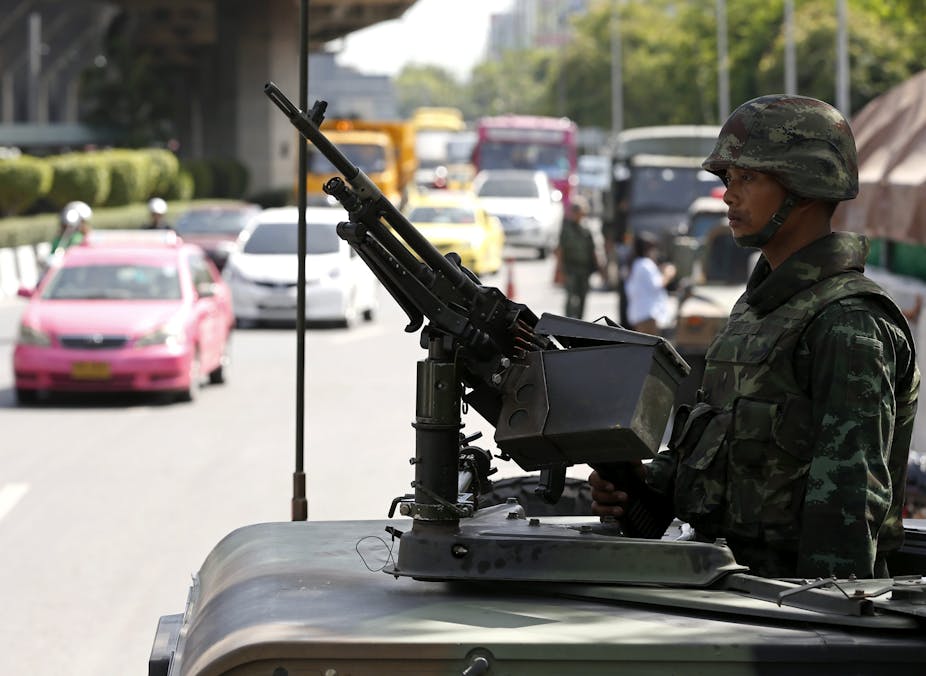In the dead of night, Thailand’s military has used a 100-year-old law to declare martial law across the country. General Prayuth Chan-ocha, the army’s commander, has said it did not overthrow the government, so this cannot be Thailand’s 19th successful coup.
Should the military move quickly and call an immediate election, perhaps it would pass the “duck test”. Yet that seems highly unlikely. So, for the moment, the declaration of martial law looks like a coup and probably is.
Aspects of this military action bear striking similarities with the last coup in September 2006, which threw out Thaksin Shinawatra. Back then, the conservative elite was in broad agreement on the need to get rid of Thaksin.
The palace’s support for that coup was a major element in elite solidarity. This time, the palace has been quieter, although several privy councillors, and others known to have links to the Privy Council, have been grumbling. It seems doubtful that the military would have acted without being sure of support in the highest places.
There are other similarities. First, the justification provided for martial law, enacted without consultation with the interim government, is remarkably similar.
Back in 2006, the military stated that it overthrew the government to prevent bloody clashes between the Thaksin government and royalist protesters known as yellow shirts. Of course, that was a concocted scenario. The palace and military had been hatching the plot for months.
Tuesday’s enactment of martial law was also said to be in response to supposedly pending clashes. Given that there has been sporadic violence for the past seven months, this claim appears as spurious as it was in 2006.
A second similarity is that the initial target of the intervention in 2006, and again today, was government supporters. The red shirt demonstration on the outskirts of Bangkok, which has been large but entirely peaceful, has been surrounded by troops. The police, also seen to be pro-government, witnessed armed soldiers surround their headquarters for several hours.
A third similarity is that anti-government protesters appear to have applauded and welcomed the military. It is likely that the business community will again support military intervention because the long months of anti-government activism have undermined the economy.
Ironically, many of Thailand’s major businesses have supported the demonstrations that have done the economic damage. This reflects the fact that much of the business class is bound to the conservative elite.
As in 2006, the military has moved to control the mainstream media, demanding “co-operation”, but shutting down pro-government media or censoring it. Censorship is now expanding to include social media.
What was different in 2006 was that the military rounded up significant members of the Thaksin government and several of its supporters, incarcerating them for hours, days or weeks. Today, while red shirts are corralled and the military is trying to convince them to disperse, no arrests have yet been reported.

The government, weakened by the Constitutional Court’s decision to throw out prime minister Yingluck Shinawatra and nine of her ministers, remains in place. Its only hope is for the military to guarantee a so-far-elusive election. Yet the government is so fragile that is may capitulate before the military bayonet.
The 2006 coup ended Thailand’s tenuous, elite-negotiated political consensus. There has since been remarkable political mobilisation in support of Thaksin and electoral politics and by those who loathe him and who have come to oppose electoral democracy, now equated with Thaksin, red shirts and rural-based majorities. The colour-coded demonstrations have tended to simplify a more complex political dystopia born of political and economic inequality, status and class-based conflict and even ethnic animosities that were long thought forgotten.
This grand unravelling has exposed the foundations of these inequalities and conflicts. Major institutions have been brought undone, mainly through their own audacious declarations of political bias: the judiciary’s double standards have been revealed; the monarchy is embroiled in political conflict; and “independent” agencies have been shown to be hopelessly prejudiced.
Along with the military, each of these institutions willingly made its way into the hands of the “side” that opposes, and even hates, elections and parliament, painting both as corrupt and willingly ousting four premiers at the head of elected governments.
How will the government and its supporters react this time? In 2006, it took them some time to break free of the military’s shackles and protest in large numbers. In 2008, when the judiciary ditched another of their governments, they again took some time to reorganise and react. Since then, red shirt protesters have three times faced military bullets as they protested, usually with the simple demand for elections. They may again be willing to challenge the military.
However, the situation and plans of the military will probably decide the way forward. An election within a suitable timeframe will likely reduce the potential for clashes. Anything else is likely to be dangerous.
Without an election, the military’s actions will, at best, further undermine Thailand’s electoral democracy. At worst, division, conflict and crisis will likely deepen.

